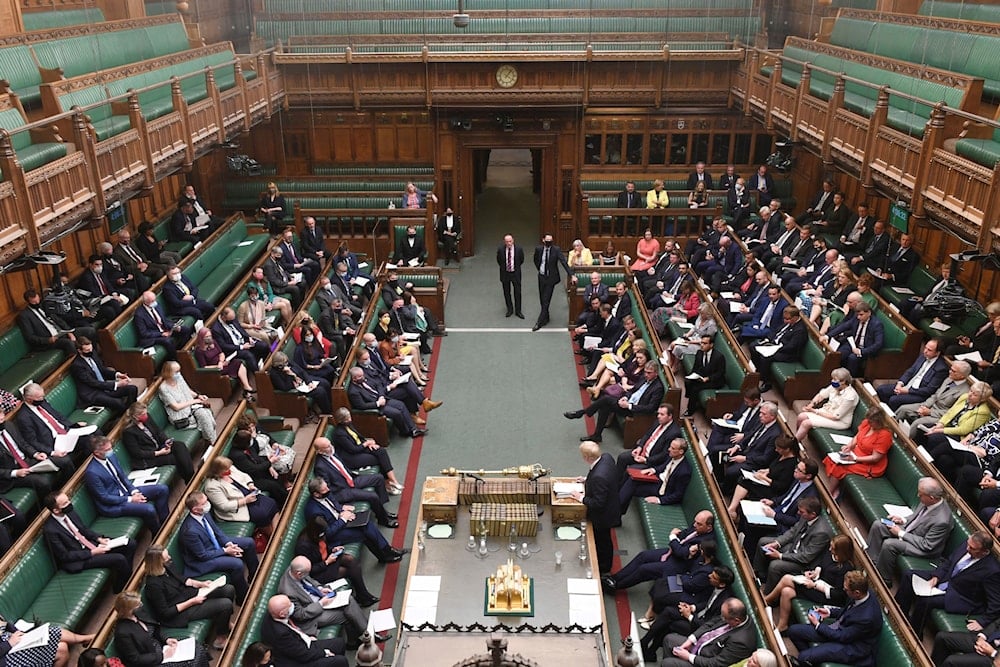New spoke in Sunak's Rwanda bill wheel: Fellow Tories condemn policy
As the second debate on the bill took place, 60 members of the Lords were listed as speakers.
-

In this handout photo provided by the UK Parliament, MPs listen to Britain's Prime Minister Boris Johnson back then giving an update on the latest situation in Afghanistan in the House of Commons, London, Monday, Sept. 6, 2021 (AP)
Even Rishi Sunak’s Conservative peers, historians, and bishops are condemning his Rwanda deportation plan, which serves as an indication that the House of Lords could demand changes delaying its implementation.
Yesterday evening, the second reading debate on the government's safety of the Rwanda asylum and immigration bill took place with 60 members of the Lords listed as speakers. The purpose of this bill is to overturn the Supreme Court's ruling that Rwanda is not a safe destination for asylum seekers to help them avoid refoulment.
It is expected that any proposed changes to the bill will be overturned by the Commons when key votes take place next month, however, the Lords seem to be standing in the way of that.
Even the far-right thinks Sunak is taking it too far
During yesterday's debate, the Conservative former chancellor and former lord chancellor, Ken Clarke, joined the archbishop of Canterbury and the historian, Peter Hennessy, in opposing Rishi Sunak's government plan to overturn a ruling by the UK’s highest court and send refugees back to Rwanda.
“I don’t think I can possibly support this bill unless it is substantially amended as it goes through this House, and we should urge the Commons to revise it,” said Lord Clarke, who has supported previous Rwanda laws. He described Sunak’s bill as a “step too far" as he agrees with removing migrants to a safe third country, but, according to him, Sunak's act sets a "very dangerous constitutional provision" for the parliament cannot overrule the courts.
“I hope it will be challenged properly in the courts because we have an unwritten constitution and it gets more and more important that we do make sure that the powers in this country are controlled by some constitutional limits and are subject to the rule of law,” Clarke explained.
Viscount Hailsham, a Tory peer who served in the Commons as Douglas Hogg, warned about the consequences of the Rwanda bill, arguing that it “can end in some very murky places." He said, “I do not believe that this bill, if enacted, will serve as an effective deterrent.”
Another Conservative peer, David Frost, stated he supported the bill but also showed concern regarding its current form not sure if it is “robust enough".
Lord Hennessy, the crossbench constitutional expert, believes the bill would diminish the UK’s standing in the world. “By rushing this emergency legislation through parliament with the intention of getting the deportation flights to Kigali underway by late spring, the government has already secured for itself a special place in British political history,” he elaborated.
“The day may not be far off when the Rwanda bill, having cleared all of its parliamentary stages, will be forwarded from the Cabinet Office to Buckingham Palace to receive Royal Assent," he added, before moving on to criticize Sunak's initiative, stating, “In the few minutes it takes to pass down the Mall and across the tip of St James’s Park and its return journey to Whitehall, our country will change, for the government will have removed us from the list of rule-of-law nations” in an attempt to emphasize that "a pick-and-choose approach to international law" will undermine his country's standing globally hinting that he might block this policy at a later date.
In addition, the Most Rev Justin Welby said, “We can, as a nation, do better than this bill. With this bill, the government is continuing to seek good objectives in the wrong way, leading the nation down a damaging path," insisting that “we need a wider strategy for refugee policy which involves international cooperation and which equips us for the far greater migration flows, perhaps 10 times greater in the coming decades, as a result of conflict and climate change and poverty. Instead, this bill offers only ad hoc, one-off approaches."
Sunak's bill survived a third reading in the Commons
On Monday, the Lords rejected a motion by the Liberal Democrats to block the bill by 206 votes to 84, a majority of 122.
Even though some Tories rebelled, only 11 Conservatives voted against the legislation. However, it will face a bigger test in the Lords, where many members have expressed unease about the plan.
Sunak has urged peers against blocking “the will of the people” by opposing the bill as he faces an election year for which he has made “stopping the boats” a key pledge of his leadership.
Meanwhile, the Equality and Human Rights Commission has warned that the bill risks the UK breaching its obligations under international law explaining that the draft legislation “undermines the universality of human rights” and, in doing so, “could expose people to harm and breaches of their right to life, their rights to be free from torture and inhuman or degrading treatment, and their right to an effective remedy”.

 5 Min Read
5 Min Read








